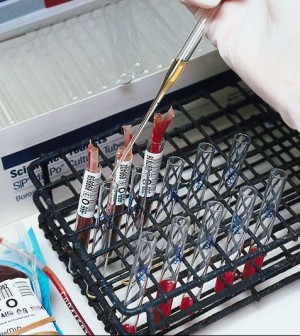- Could Artificial Sweeteners Be Aging the Brain Faster?
- Techniques for Soothing Your Nervous System
- Does the Water in Your House Smell Funny? Here’s Why
- Can a Daily Dose of Apple Cider Vinegar Actually Aid Weight Loss?
- 6 Health Beverages That Can Actually Spike Your Blood Sugar
- Treatment Options for Social Anxiety Disorder
- Understanding the Connection Between Anxiety and Depression
- How Daily Prunes Can Influence Cholesterol and Inflammation
- When to Take B12 for Better Absorption and Energy
- Epsom Salts: Health Benefits and Uses
Benefits of Iron Supplements Unclear for Pregnant Women, Young Children


Taking iron supplements during pregnancy doesn’t appear to significantly change any health outcomes for mom or baby, a new review shows.
A second review — this one on infants and toddlers — found no evidence that iron supplements improved growth or development.
Both conclusions come from a U.S. Preventive Services Task Force (USPSTF) review of the latest research on iron supplementation and screening for pregnant women, babies and young children.
The USPSTF determined that there isn’t enough evidence to recommend that pregnant women or infants and children receive iron supplements or be screened for iron deficiencies. But, they also noted there isn’t enough evidence to recommend against either practice.
The recommendations regarding prenatal supplements are an unchanged update from those in 2006. What’s new is that this study also finds no evidence to support routine screening.
“There is not enough research to demonstrate that women need to be routinely screened for iron-deficiency anemia or that they should routinely take iron supplements in the absence of symptoms,” said Dr. Amy Cantor, lead author of the prenatal study.
“It is not particularly harmful to take an iron supplement, but it may not be necessary,” added Cantor, who is an assistant professor of obstetrics and gynecology and family medicine at Oregon Health & Science University in Portland.
Generally, a healthy pregnant woman who does not have symptoms of low iron does not need any more than the 27 milligrams per day of iron that the Institute of Medicine recommends, Cantor said.
Her team analyzed the evidence from 11 trials on pregnant women routinely taking iron supplements. It found that supplements didn’t affect women’s quality of life or rates of C-sections, underweight newborns, preterm birth or infant death.
The researchers did find that women’s iron levels improved with supplements. But, whether or not there is a benefit from this change is unclear, according to the investigators.
The researchers didn’t find any studies looking at the benefits of screening for iron deficiency.
Not everyone was on board with the USPSTF recommendations.
Iron helps blood carry oxygen and nutrients throughout the body, so low iron levels can cause problems during pregnancy, said Dr. Andre Hall, an obstetrician and gynecologist at Birth and Women’s Care in Fayetteville, N.C.
“In addition, if a mother is anemic, she has less reserve in cases of bleeding during delivery,” he said.
According to Dr. Jill Rabin, co-chief of the division of ambulatory care at Women’s Health Programs-PCAP Services in the North Shore-LIJ Health System of New Hyde Park, N.Y., doctors may still recommend that women take iron supplements and continue to screen for iron deficiency at the beginning of prenatal care and late in the third trimester.
“We still continue to recommend supplements and screening because we know iron helps carry the blood to the mom and the baby,” said Rabin. “There are no major harms, and the benefits may be enormous, so we should just keep doing what we’re doing and keep doing more research,” she said.
The most common problems associated with taking iron supplements were nausea, constipation and diarrhea that went away on their own, study author Cantor said. Women can get iron through a diet rich in dark green leafy vegetables, various meats and seafood, beans, dried fruit and iron-fortified cereals, breads and pasta, she said.
The findings in infants and toddlers were similar to those for pregnant women, according to Marian McDonagh, a professor of epidemiology at Oregon Health & Science University in Portland, and lead author of that study.
McDonagh’s team reviewed 10 trials they identified that measured effects of iron supplements in children aged 6 months to 2 years.
“Although some evidence on routine iron supplementation in children ages 6 to 24 months indicates improvements in hematologic [blood] values, limited evidence from controlled studies indicates no benefits in growth or neurodevelopmental test scores, and no other clinical outcomes have been evaluated in the literature for children living in developed countries,” McDonagh said. “The effects of routine iron supplementation in young children are unknown at this time.”
As in the maternal studies, the researchers weren’t able to find any studies that measured the benefits or harms of screening children for iron deficiency.
The American Academy of Pediatrics recommends screening children before age 2, and this review doesn’t have enough evidence to sway recommendations that are in place, according to Dr. Roya Samuels, a pediatrician at Cohen Children’s Medical Center in New Hyde Park, N.Y.
“Despite the conclusions, it’s still important to do routine iron screenings, especially in infants and toddlers because that age range involves rapid growth, and there’s a higher likelihood that there could be problems with eating,” Samuels said. “Toddlers who only want to eat bread and pasta may not be getting enough iron.”
The findings on pregnant women were released online March 30 in the Annals of Internal Medicine. The findings on children were published in the April issue of Pediatrics.
More information
Learn more about preventing anemia from the U.S. National Heart, Lung, and Blood Institute.
Source: HealthDay
Copyright © 2026 HealthDay. All rights reserved.










